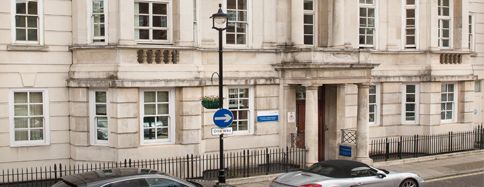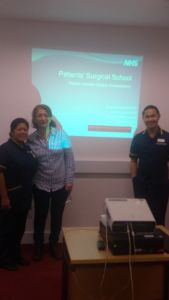Fellowship great professional experience for Maltese nurse

Since February 2018 I work as a uro-oncology practice nurse navigator. I have taken up this post after having worked as a nursing officer in a urology ward for 8 years. The practice nurse navigators have been established in Malta as part of a national cancer plan for the Maltese Islands (2017-2021), set out to address the emerging new challenges in cancer control.
Nurse navigators offer individualised assistance to patients, families and caregivers to help overcome healthcare system barriers, provide education and resources to facilitate informed decision-making and timely access to quality health and psychosocial care throughout all phases of cancer care.

Me, Ms. Nora Chu and Mr. Jonathon Saviano at the Surgical School
EAUN fellowship
I was lucky to have been granted a fellowship programme by the EAUN for the second time. In September 2016 I had the opportunity to visit the NKI-AVL Oncology Hospital in Amsterdam (see European Urology Today October-December 2016). At that time I was in charge of a urology ward in Malta and responsible for the coordination of intravesical therapy for bladder cancer patients.
At NKI-AVL oncology hospital I did not just to observe and exchange clinical practice; my one-week experience with Ms. Corinne Tiller (one of the clinical nurse specialists) gave me the drive to choose a new path in my career: the role of a uro-oncology practice nurse navigator.
Experience in urology and management
My management role inspired me to identify gaps between acute urology and oncology care, but the interest to work in the field of uro-oncology was mostly inspired by the EAUN and the opportunities to network and meet with inspiring urological practitioners during the annual conferences, the fellowship programmes and the European School of Urology Nursing (ESUN) bladder and prostate cancer courses, which I attended in 2017 and 2018.
Care pathway coordination
Since I embarked on my new career pathway, I have been working on local clinical pathways for urological cancers namely prostate, bladder, kidney, penile and testicular. In July I started coordinating the care pathways of prostate, bladder and kidney cancer patients: from being present during the breaking of the news to offering psychological support and information required to both the patient and his/her relatives, both in the acute and the oncology hospital (Mater Dei Hospital and Sir Anthony Mamo Oncology Centre).
Robot-assisted laparoscopic prostatectomy at UCLH
I applied to the EAUN to visit the uro-oncology centre of the UCLH to see how this important uro-oncology facility manages these services. I believe such first-hand experience can boost my knowledge and understanding and improve my competences as a uro-oncology practice nurse with focus on prostate cancer. Our hospital has a close training cooperation with UCLH. Moreover, some of our patients are referred to UCLH to have their robot-assisted laparoscopic prostatectomy.
Furthermore, I also believe that as patients become more demanding and the complexity of the health care delivery system increases, the need to intensify knowledge through research, networking and exchange of best practice becomes increasingly important.
Successful EAUN fellowship at UCLH
My visit at UCLH was well organised by Ms. Hilary Baker (Lead Clinical Nurse Specialist (CNS) for Urological Cancers. At Westmoreland Street I was mentored by uro-oncology CNSs Nora Chu and Jonathon Soviana who are responsible for prostate cancer patients. At the MacMillan Centre I was well taken care of by Janet Forgenie and Hazey Mc Bain, CNSs for prostate, bladder and penile cancers.
My fellowship programme schedule was as follows:
Monday, 3 December
Welcome, Post Cystectomy Nurse Led Clinic, MRI prostate Multi Disciplinary Prostate Meeting, Nurse-led Follow Up Clinic Post MRI
Tuesday, 4 December
Prostate Clinic (one stop clinic, new diagnosis, treatment decisions, active surveillance)
Wednesday, 5 December
MacMillan Centre Clinic, observing advanced prostate cancer management
Thursday, 6 December
Post Surgical School, Nurse Led Post RALP Clinic
Friday, 7 December
Multi Disciplinary Team (MDT) Meeting (Wimpole St.), Surgical School, Post MDT Meeting Clinic with the uro-oncology team
The host institution
The new state-of-the-art University College Hospital (UCH) is located on Euston Road, urology services are provided at UCH at Westmoreland Street, while treatment and other support services for cancer patients and their families are offered at The UCH Macmillan Cancer Centre at Huntley Street.
The urology services at Westmoreland Street include:
• Inpatient Stone Team Services (patients being admitted for operations)
• Robotic Surgery inpatients
• Andrology inpatients
• Male reconstructive inpatient surgery
• Adolescent urology inpatients
• Urological Cancer patients
• Functional restorative and female urology inpatients
• All urology outpatients clinics
My experience
It is impressive how urological cancer care is provided in this hospital. There is a close collaboration between the UCLH team and the GP. Patients travel all over the UK to receive the specialist cancer care that UCLH offers. I was also impressed to see how many patients choose to take part in clinical research studies. The nurse-led clinics are lead quite professionally by CNSs. It was evident how knowledgeable the nurses are, as well as being good listeners and supportive to their patients. They took time to explain everything their patients wanted to know about their prostate cancer and all the investigations, including the MRI in the post-MRI meeting clinic.
Communication skills and extensive knowledge
The communication skills of the nurses and the extensive knowledge on prostate cancer, facilitated the relationship with the patient and led to patient satisfaction and less anxiety. There was time to discuss their concerns and their care pathway before any other investigations and surgical interventions were performed.
Another nurse-led clinic I attended was the postprostatectomy clinic. The nurse was very professional in her holistic assessment of her patients. She mainly focused on post- operative incontinence, sexual dysfunction and coping skills.
Effective communication
Effective communication was also evident between the physician and the uro-oncology nurse specialist whom I followed throughout my visit at UCLH. There is a close working relationship with an open attitude and a feeling of mutual respect and trust which facilitates the decisions taken by the CNS.
I also had the opportunity to assist Mr. Timm Briggs (consultant urological surgeon) at Westmoreland St. during one of his clinics (Post MDT Clinic) as well as Dr. Mark Prentice, Clinical Fellow in Clinical Oncology, at the MacMillan Centre. I was really welcomed in their clinic, for which I am very grateful. The team took their time to explain everything I wanted to know and ask with regard to management of the prostate cancer patient, both at the stage of active surveillance and at the advanced prostate cancer stage.
The Surgical School
Every Friday, the surgical education session is held at UCLH Westmoreland Street for patients who will be having a prostatectomy. It is also part of an enhanced recovery programme. The session is intended to facilitate post-operative recovery and care. Information is given about the operation, post-operation care and care at home. It has been shown that patients who attend Surgical School recover faster because they are aware of each milestone along their pathway. It was evident from the way patients asked questions and were involved in the discussion that this educational session is beneficial for them. This session was very useful and enabled me to enrich my knowledge about various topics, such as the way the operation is performed, pelvic floor exercises (or Kegal exercises) and the management of erectile dysfunction.
What I have learnt from this experience
Not only have I reached my visit objectives, I have also reflected on the importance of networking in nursing. I analysed the level of care that we deliver in our country compared with other European countries. I tried to share information – clinical, administrative or research-based – which is necessary for and beneficial to improving our health care system.
An important and impressive observation is the connection between the urology team at UCLH and the GP in the community. Another important observation is the way the CNS ran their clinic, the way they explained everything related to prostate cancer, from the stage of the disease, the investigations and the management, to the information given to help patients decide on their treatment options.
The experience I gained will surely boost my knowledge with regards to uro-oncology and the way I will organise patient care. I would again encourage all EAUN Members to apply for a fellowship programme.
My sincere gratitude goes to the EAUN for giving me this great opportunity. Finally I would like to thank everyone in the team involved in organising my visit at UCLH for their warm welcome, especially Ms. Hilary Baker, Ms. Nora Chu and Mr. Jonathon Saviano who really went out of their way to mentor me and make my visit a valuable learning experience
Helen Attard Bason, Health Department Mater Dei Hospital, Dept. of Urology, Msida (MT), habason@maltanet.net

